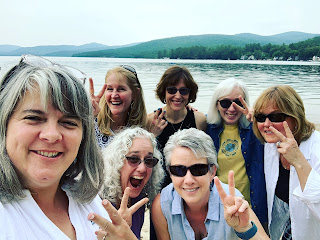Oh my, it has been a while. My last post was October 2019! Well, we all know what happened shortly after that. I have so much respect for those who were able to keep writing, create materials to share, etc. I on the other hand, was in triage mode for a few months and then I just lost my motivation. Being thrust into teletherapy overnight was one of the hardest things I ever did and yet, I remain grateful because I learned so much. Yes, I was strapped to my computer 8-10 hours per day planning. Yes, I live in a rural area and had TERRIBLE WiFi. Yes, I was anxious about what we were experiencing, but I embraced the situation and used strategies, techniques, and technology that allowed for quality therapy. In the grand scheme of things for me, that piece only lasted 3 months. We did offer Extended School Year remotely, but I was able to go into the building and use the WiFi which was a game changer.
We returned to in-person education for the 2020-21 school year and I am so grateful for that. It was actually a wonderful year. My speech assistant and I were creative and effective in providing the level of speech-language therapy we knew our kids deserved, and we were face to face (with a little plexiglass between us). Nevertheless, I was a little older, a little more tired, and a lot out of the blogging world.
Two years later, here I am. The 2021-22 and 2022-23 school years flew by and in September 2022, I made the difficult decision to retire from the my school-based career.
 |
| Peace Out! I'm retired! |
What's next? I'm not done yet! I'm on to my next great adventure. In all this I've continued to hone my skills as a clinician and the logical next step is to take Doyle Speech Works into the private practice world.
I've rented an office, moved my materials, and set up shop. It's a beautiful old building and I love the color I chose for the walls. The brick is one of my favorite features. It's small, but I don't plan on groups! Extra bonus; it's above a wonderful market and coffee shop. I began seeing clients in May and I absolutely love it. There were quite a few logistical tasks to accomplish and I am NOT a business person...yet. I'm figuring it out with the help of some friends and professionals. I truly enjoy sitting at my desk, planning therapy and doing a little paperwork. My plan is to work 3 days a week, I am retired after all. :) I am also not completely out of the schools, as I've contracted with our district to work in the high school 2 days. Ironically, my first job, in 1983, was in a high school! I was 22 years old and my students were 18. Crazy! It seems I've come full circle.
The goal for my resurrected blog is to continue to share my journey as well as activities and suggestions that I've found helpful. I don't know if blogs are passé, but I'm excited to write again. Until next time...



















